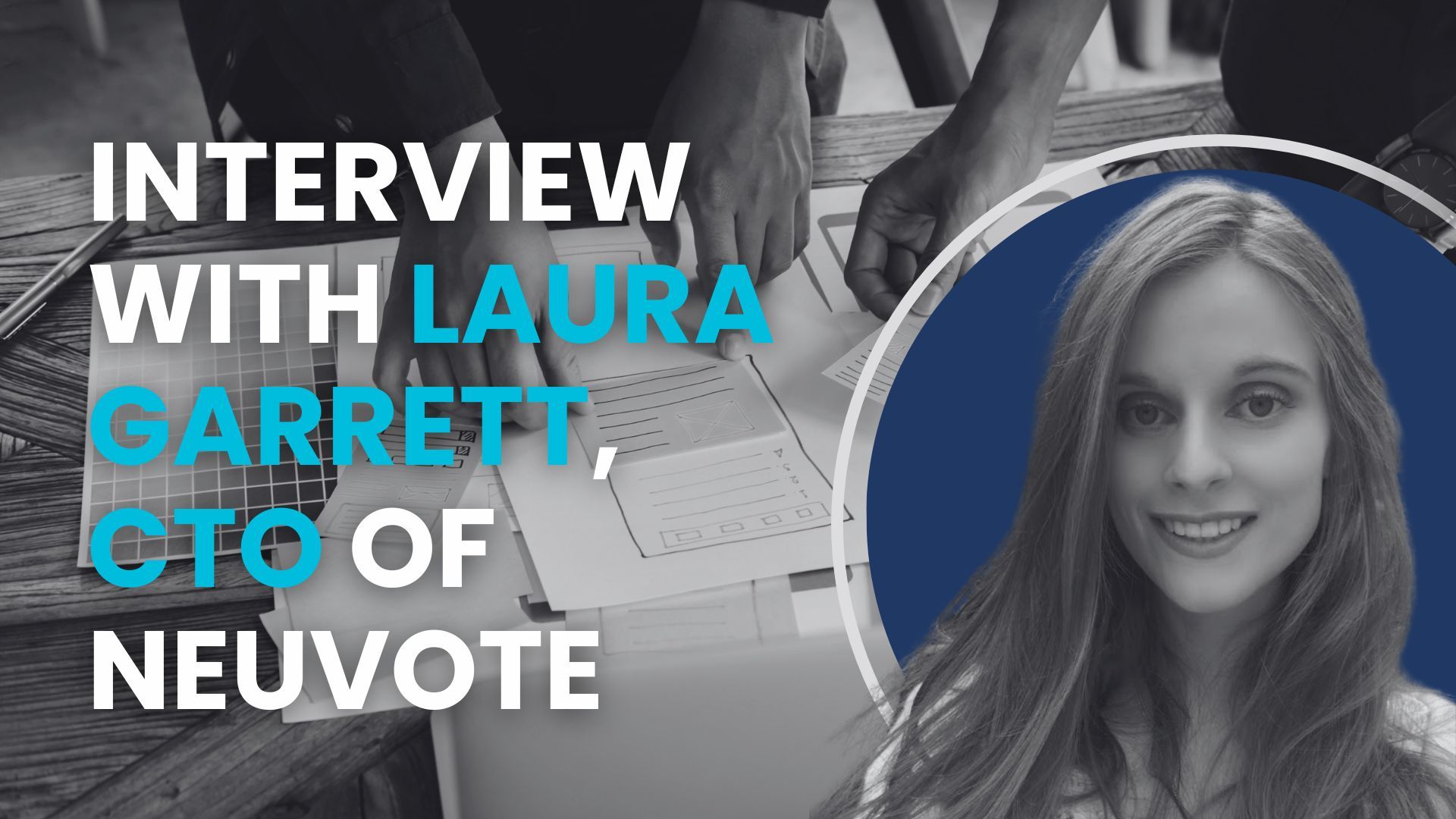Unveiling Innovation: Interview with Laura Garrett, CTO of Neuvote

In the dynamic realm of technology, pioneers often emerge from unexpected paths, driven by an innate curiosity to solve complex puzzles. Laura Garrett, the newly appointed Chief Technology Officer (CTO) of Neuvote, exemplifies this spirit as she seamlessly weaves together her passion for problem-solving and technology. With a background that blends biology and computer science, Laura's journey into the tech world took a turn during her university years, ultimately leading her to excel in the intricate domain of software development.
In this exclusive interview, Laura reflects on her inspirations, her vision for Neuvote's technology department, and the experiences that have fortified her for the pivotal role of CTO. As a visionary leader, she shares her strategies for integrating innovative technology features, fostering enhanced support systems, and aligning Neuvote's platforms for a seamless user experience. Furthermore, she candidly addresses the challenges posed by a rapidly evolving technological landscape, advocating for transparency, data privacy, and cybersecurity awareness.
What inspired you to pursue a career in technology?
I’ve always liked math and jigsaw puzzles – as a child, I couldn’t get enough of puzzles and numbers. My dad filled our house with educational (and fun) toys. When I would get bored as a toddler, I used to stare at the illustrated posters of numbers that decorated our walls, thinking about all the ways the bigger numbers could be made from smaller numbers. I taught myself addition before starting kindergarten.
My parents got me a new puzzle each year over the holiday season. I started with small puzzles and worked my way up to 1000-piece ones as I got older. I loved unwinding with puzzles every winter break. I remember one Chrismukkah, my dad got me a customized puzzle. It was based on an extract from the National Topographic System map of Canada, and the section used to create the puzzle was centered around our house and included a house-shaped centerpiece. It was such a special gift. My parents still give me puzzles over the holidays; I recently received a 2000-piece puzzle of Jerusalem!
Coding can be a lot like a jigsaw puzzle, so it really appealed to my puzzle-solving nature. That being said, I didn’t really get into technology until my third year of university. Until that point, I had been studying biology, thinking I would pursue a medical career like my mom. However, in my third year, I deviated from my mostly biology course load to try a computer science course. I enjoyed it so much that I signed up for more courses, eventually adding a computer science major to my program.
As the CTO, what are your primary goals and priorities for Neuvote's technology department in the coming year?
At Neuvote, I think we’ve built a strong core product. So, my primary goal is maintaining and building upon what we have. Of course, with technology, there are always updates required just to maintain the codebase, but there are also some interesting features we’d like to explore.
One such feature would be to increase ease of use while maintaining security by exploring different forms of authentication, specifically facial authentication. One possibility would be adding the ability to enroll a user based on an official ID photo; when they log in, their live capture is compared to the profile based on their verified image. This can be much less daunting than entering a code from an authenticator app.
I’m also interested in how we can improve help & support.
ChatGPT is, of course, a big buzzword today. However, buzz or not, AI does offer incredible opportunities to provide helpful, customized support, especially through AI chatbots that can be trained with platform-specific data and then provide platform-specific answers as well as step-by-step instructions on how to approach the most common user problems.
I’m also interested in connecting our two platforms - Civik, the civic management platform, and Neuvote, the election management system. Integrating both platforms would allow voters to seamlessly jump from reading about, discussing, and engaging with candidates on one platform to voting for their preferred candidate on the other. Also it enables candidates to get real-time feedback about which issues are the most important to their constituents. Down the line, this integration could also simplify the process of calling for internal elections for various organizations.
Can you share with us your background in the technology industry and the experiences that have prepared you for the role of CTO at Neuvote?
I graduated with a computer science major from the University of Toronto, then joined the startup world and learned many more skills. My experience working at Allyus, a political social network – like LinkedIn for politics – was especially beneficial. I learned a lot about governments’ and organizations' difficulties when communicating effectively with their constituents and members through existing social media channels. As well as the benefits and pitfalls of anonymity online. This gave me significant experience for Civik. Working on a social network was also an educational experience in regard to online authentication methods as well as cloud infrastructure, security, and scalability.
What about Neuvote made you want to join the team?
I found out about Neuvote from Ben Shahin, the CEO of Allyus, a startup also focused on civic engagement and democracy. When I saw how the companies' visions aligned and how Matthew and Neuvote strive to make democracy more accessible while enhancing security, I really wanted to be a part of the team. I feel honored to be a part of a company that uses technology to protect democracy. I’ve always wanted to work with people who want to make a positive impact on the world and joining the Neuvote team has given me that incredible opportunity.
In today’s rapidly changing technology world, what do you see as the challenges ahead of Neuvote and your technology team?
One of the biggest challenges is that as technology evolves, so does the number of people trying to exploit it. This creates feelings of mistrust towards technology (and sometimes, in the case of certain companies, rightly so). I think that increased transparency from technology companies would be hugely beneficial to society. As well as increased educational resources for everyone on data privacy and the basics of cybersecurity. So people can make an educated evaluation of whether to trust a certain company or service with their data and if they do decide to use a service, take informed actions to keep their accounts secure.
This mistrust of technology is especially prevalent when it comes to online voting. So, that is a direct challenge for our team. At Neuvote, we strive to be transparent. There is no reason for secrecy around exactly what user data is stored, why it is stored, and how it is used.
Additionally, our elections use End-to-End Verifiability (E2EV) which creates a unique tracking number cryptographically linked to how each voter cast their vote, enabling each voter to verify that their vote was cast correctly and ensuring that any attempt to tamper with the ballot can be detected. This system provides anonymous, accurate, tamper-proof elections.
Technology creates many incredible tools to make aspects of everyday life more accessible. Unfortunately, technology also allows misinformation to spread at speeds never seen before. The phrase, “A lie can travel halfway around the world while the truth is still putting on its shoes,” comes to mind. This misinformation can further feed into suspicions of online voting. In Civik, our civic engagement platform, we have incorporated Newsguard to help people understand the credibility score of the source of the information they’re viewing. Without censoring what people share, we provide background information to allow users to come to their own conclusions about the source's reliability.
What is the most interesting or exciting part of being a CTO?
As CTO, I get to be at the forefront of new technology. As a lifelong learner, the opportunities to sharpen my skill set and learn new tools and how they can be applied to our system are exciting.
The way the entire technology suite functions is fascinating to me; there are so many pieces working together to make the technology both secure and accessible. I get to work with members of the team in Estonia who built the extraordinarily secure i-voting system. It's fascinating to read about the intricacies of their technology. Additionally, I have the opportunity to work with and learn from cybersecurity experts. I also get to hear about the experiences of people who have worked in voting technology for years and learn from past challenges and solutions, both technologically and otherwise.
The technology world is known for being male-dominated. What advice would you give other women who want to pursue a career in technology?
I was very fortunate to have grown up in an exceptionally egalitarian home. My mom worked as a medical doctor, and my dad, an actuary, did chores around the house — cooking, cleaning, laundry, etc. As a child with this home life, it never occurred to me that there would be anything that I couldn’t do because I was female. I loved math and physics, and I excelled at them. In high school, I started to realize that society did not expect females to be good at math and science, especially females with blonde hair, but it didn’t bother me. Despite being a common theme in movies, I didn’t get the impression that people in real life, at my high school, thought this way. However, in university computer science, I started to feel that some of my peers expected me to fail. I made a few friends in classes, but our classes together were scattered, and overall, I felt alone. These feelings of isolation and expectations of failure triggered my anxiety. Despite being interested in the course content, I remember multiple exams where my brain went completely blank from anxiety and I had to take valuable exam time to focus on trying to calm down enough to think. I was very fortunate to have a strong support system at home, and I was able to persevere through the program, proudly graduate, and pursue a career in technology.
I think as women, we are much more likely to develop imposter syndrome.
Unfortunately, once we start doubting ourselves, there is no shortage of people more than willing to label our lack of confidence as a lack of skill. Thus validating our feelings of insecurity and creating a vicious cycle of self-doubt. As difficult as it can be, take pride in every one of your achievements and never minimize them. When people tell you that you’re doing great work, believe them, don’t assume they’re just being polite. Celebrate your achievements and keep learning. Remember that no one can possibly know everything and it’s often the loudest, most arrogant people who know the least. Don’t let them intimidate you. Follow your passion and believe in yourself. There are so many kind, brilliant people out there. You’ll find them, have mutual respect for each other's skills, and support each other in reaching your goals.
What is the best part of being part of the larger Neuvote team?
I love being a part of the larger Neuvote team. I've met so many kind, brilliant people from all across the world, all of whom share a passion for protecting democracy. I love learning from their experiences in the industry and hearing their perspectives. I feel privileged to be able to contribute to the team.

